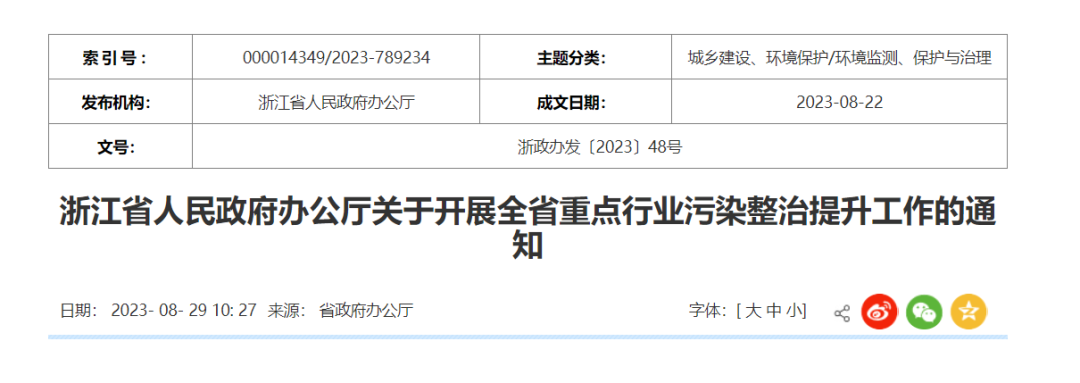Recently, the General Office of the Zhejiang Provincial Government issued the “Notice on Carrying out Pollution Remediation and Improvement in Key Industries in the Province”, proposing to complete the recycling and dismantling of scrapped motor vehicles, recycling of renewable resources, and waste plastics through three years of efforts. 13 key industries including processing have been rectified and improved.

What are the specific 13 key industries?
Recycling and dismantling of scrapped motor vehicles, recycling of renewable resources, waste plastic processing, waste rubber utilization, mustard pickling, ship repair and building, composite cloth processing, wooden furniture, building materials and stone processing, sintered bricks, glass manufacturing, chemical industry and electroplating.
Before the end of 2023, we will comprehensively launch the pollution control and improvement work in key industries, and complete the improvement and improvement of two industries, including the recycling and dismantling of scrapped motor vehicles and mustard pickling.
By the end of June 2024, the shipbuilding and shipbuilding industry will be rectified and upgraded; by the end of December 2024, 7 industries including renewable resource recycling, waste plastic processing, waste rubber utilization, composite cloth processing, wooden furniture, building materials and stone processing, and sintered bricks will be rectified. promote.
Before the end of 2025, the rectification and upgrading of three industries including glass manufacturing, chemical industry and electroplating will be completed.
How will the remediation work be carried out? Let’s find out together.
Scientific formulation of work plan
Each district and city has comprehensively mapped out the distribution and number of enterprises, workshops and processing households engaged in production in 13 key industries, and compiled a list of enterprises for improvement and improvement.
Generate a list of problems from the aspects of process equipment, pollution prevention and control, energy conservation and consumption reduction, environmental management and risk prevention and control, formulate a corresponding list of measures and responsibilities, prepare a preliminary improvement plan for each industry, and submit it to the Provincial Department of Ecology and Environment to participate in the plan evaluation .
The Provincial Department of Ecology and Environment took the lead in organizing the program selection in stages in the form of “unveiling the list and taking charge”, and selected one “demonstration rectification plan” by industry. Each district and city will refer to the “Demonstration Remediation Plan” and further optimize and improve it based on local realities, then formulate and implement implementation plans for pollution remediation and improvement in relevant key industries.
Remediation of outstanding issues by industry
Five industries, including scrapped motor vehicle recycling and dismantling, renewable resource recycling, waste plastic processing, waste rubber utilization and mustard pickling, focus on eliminating “loose and polluting” workshops and processing households, and guide the orderly exit of inefficient production capacity.
Two industries, including composite cloth processing and wooden furniture, focus on transforming and improving source substitution of raw and auxiliary materials for volatile organic compounds and inefficient waste gas treatment facilities.
The ship repair and building industry focuses on transforming the sewage collection and treatment system, comprehensively carries out the collection and treatment of painting exhaust gas, and guides the use of raw and auxiliary materials with low volatile organic content.
The building materials and stone processing industry focuses on cutting, grooving, polishing and other processes, and implements requirements for full collection and treatment of dust and site sewage.
In two industries, including sintered bricks and glass manufacturing, the focus is on eliminating high-sulfur fuels and improving the level of flue gas collection and treatment.
The chemical industry focuses on promoting the transformation and upgrading of production technology and equipment, strengthening the collection and management of all sources of volatile organic compounds and the construction of wastewater pipe corridors.
The electroplating industry focuses on promoting centralized pollution control in industrial parks and coordinating the construction and management of “zero direct sewage discharge areas” and unified solid waste collection and transportation facilities.
Carry out acceptance and consolidation improvement of rectification results
After the rectification is completed, each district and city will conduct self-evaluation and acceptance of the rectification and improvement of each industry through procedures such as spot inspections and unannounced visits, expert reviews, and public announcements.
The Provincial Department of Ecology and Environment, together with relevant provincial units, evaluates the improvement effectiveness of various districts and cities by industry according to the environmental governance level assessment system, and selects a group of cities with outstanding governance performance and environmental protection “leading” enterprises. All districts and cities must carefully summarize the work experience in rectifying and improving key industries, form a long-term supervision mechanism for pollution problems in key industries, strengthen grassroots grid management and coordinated linkage of departmental professional inspections, and effectively realize the full discovery, rapid disposal and closed-loop of hidden pollution risks. management to strictly prevent the recurrence of pollution problems in key industries.
In addition, the “Notice” clarifies that the pollution control and improvement work in key industries will be included in the assessment of the construction of a beautiful Zhejiang and the index evaluation of the Provincial Party Committee’s “Seven Issues List” of major ecological and environmental protection inspection issues. Selected environmental protection “leading” enterprises can be given priority support in the supply of energy, land, emission rights and other factors. If the rectification work is not implemented, the problem rectification is not thorough, and the major pollution risks are not effectively eliminated, an early warning will be notified, listed for supervision, points will be deducted in the assessment, or included in the provincial party committee’s ecological and environmental protection inspection as a typical negative case.
All cities and counties (cities, districts) should actively improve fiscal, credit, green finance, land and other policies and measures that are conducive to the improvement of pollution control and improvement in key industries, and guide enterprises in key industries to improve their environmental governance levels.

 微信扫一扫打赏
微信扫一扫打赏

